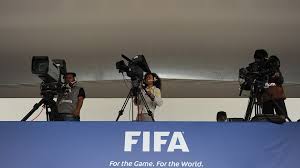By Mark Baber
June 13 – The dispute between authorities in Egypt and FIFA over the latter’s sale of exclusive World Cup broadcast rights in Egypt to Qatar-owned beIN sports has intensified with Egypt’s Competition Authority (ECA) saying it will oblige FIFA to allow the state broadcaster to broadcast 22 matches, including those of the Egyptian national team.
The ECA said it had decided to “halt the negative FIFA decision of declining to give broadcast rights for 22 matches of the World Cup in Russia to (Egypt’s) National Media Authority (NMA) and all its effects, and to oblige FIFA to grant the aforementioned direct terrestrial broadcasting rights.”
In a statement issued Tuesday the ECA said that an investigation had been opened under The Common Market for Eastern and Southern Africa (COMESA) auspices against FIFA over the issue.
The move follows on from a statement earlier this week when the ECA said: “The ECA has ordered interim measures against FIFA based on prima facie finding of infringements to articles 7 and 8 of the Egyptian competition law, as it was revealed that those infringements would cause serious and irreparable damage to the freedom of competition and consumers, insofar they will prevent consumers from receiving the right to watch the 2018 World Cup in Russia under competitive and fair conditions.”
FIFA awarded beIN Sports exclusive media rights pertaining to the 2018 FIFA World Cup Russia covering cable, satellite, terrestrial, mobile and broadband transmission across 23 territories and countries in the Middle East and North Africa, including Egypt.
However, the ECA holds that this deal contravenes FIFA’s own TV licensing policy, by virtue of which 22 matches must be made available on free-to-air terrestrial channels, that include all home team matches, the opening match, semi-finals and the final.
As well as infringing its own rules, the ECA claims the deal with beIN will “represent a likely infringement to article 34 of the Egypt-EU Association Agreement as well as articles 16 and 18 of the Common Market for-Eastern and Southern Africa (COMESA) for inflicting a potential harm to the freedom of competition within the COMESA common market. Moreover, the Swiss Attorney General is undergoing a similar inspection regarding very similar practices, which represent likely infringements to the Swiss Federal Act on Unfair Competition, against the former and current management of FIFA.”
It remains unclear how the ECA intends to enforce its stance, but it has issued a warning to private and public entities in Egypt of “their obligation to comply with the ECA’s decision and their duty to facilitate the Egyptian National Media Authority’s mission in obtaining all the rights as referred to in its decision. The non-cooperation of any of these entities subjects them to legal liability rules regarding this matter without prejudice to the civil liabilities arising from the non-implementation of the ECM decision.”
In Egypt, the cost of a beIN decoder is around €77 and the fee to watch the World Cup is around €95, which puts the price of a subscription beyond the reach of many working Egyptians, although many are expected to watch the games in cafes and restaurants.
Contact the writer of this story at moc.l1745266280labto1745266280ofdlr1745266280owedi1745266280sni@r1745266280ebab.1745266280kram1745266280

